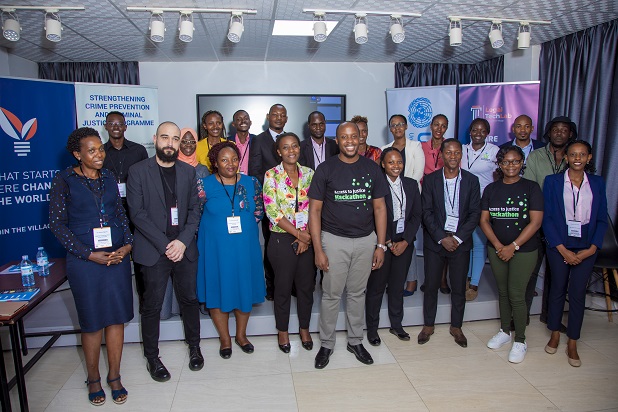Winners of the Access to Justice hackathon that took place during the Future Lawyer Week pose for a picture with judges and partners.
As the legal industry continues to evolve, experts predict that emerging trends and technologies will transform the way legal services are delivered and accessed in the coming years. From artificial intelligence and blockchain to alternative legal service providers, the future of law is set to look very different from the past.
In partnership with United Nations Office on Drug and Crime (UNODC) in Uganda and Cosmonaut Limited (UK), the Innovation Village this week held the first ever Future Lawyer Week Africa, a three-day event aimed at bringing together legal practitioners, tech experts and industry players across the continent to stimulate conversations on how to fuel an innovative mindset to drive technology adoption and attract investment into the sector.
Speaking at the event, Hellen Mukasa, LegalTech Lab Lead at Innovation Village said, “Today, the digitalization agenda has become an imperative for all economies globally with governments, citizens and businesses increasingly digitalizing their operations and adopting tech-enabled solution geared towards improving their work processes.
Unfortunately, only a handful of legal professionals and justice institutions seem to have joined this transformation journey. Although, they many continue to work in silos which makes collaboration difficult to achieve.
Mukasa said, “It is for this reason that we have decided to host the Future Lawyer Week Africa with the collective agenda of building partnerships, sector collaboration and synergies to create a digitally driven and integrated ecosystem where technology can be leveraged to create more synergies and make the legal system more accessible and equitable to all through streamlined processes, increased citizen participation and easy access to legal aid and information” Mukasa said.
While officiating the event, Justice David Wangutusi emphasized the need for the legal sector to quickly integrate technology in their day-to-day tasks so that issues such as high court case backlogs, delayed administration processes, cost of legal services, and inefficiency can be dealt with. “Young lawyers should harness digital tools such as video conferencing, E-Filling, case management systems and data analytics to reduce delays in legal proceedings, access case-related information or precedents, analyze data to identify areas of concern and take corrective actions to prevent wrongful conviction.
Sharon Lesa Nyambe, Head of Office at the United Nations Office on Drug and Crime in Uganda further noted, as embedded within the UNODC mandate which entails creating an enabling environment for equitable access to justice, ensuring inclusion and an effective criminal justice system.
“We believe technology has the potential to transform the challenges affecting the justice system and can support institutions within this ecosystem to optimize and refocus their business processes, improve service delivery to users, protect human rights and increases the efficiency of the administration of criminal justice.”
Nyambe said, “I would to congratulate Justice Chap Chap, Thinkers and NALAW Foundation for winning the Access to Justice Hackathon challenge which was one of the activities executed at the future lawyer week.
With the support of our partners at Innovation Village, we converged over 60 innovators and tech enthusiast to develop practical tech and tech-enabled solutions aimed at bridging the access to justice gap in Uganda in the thematic areas of: Public sector accountability, legal services and legal aid and Information Dissemination and Education” Nyambe said.
Adding, we continue supporting these innovators accelerate especially the winners to refine and scale their solutions into solid business enterprises that serve large institutions within the justice sector.
A report published by the Justice Law and Order Sector in Uganda in 2019, estimated that approximately 80% of the population does not have access to legal services. The report further highlights that there is a shortage of legal aid providers, with only 130 lawyers and 200 paralegals available to serve the entire population of Uganda. This shortage means that many people are unable to access legal representation, particularly those who live in rural areas and cannot afford to pay for private legal services.
At the Innovation Village, we believe that through the introduction of e-justice platforms, citizens will be able to navigate the complexities of the law and enjoy more frequent and quality interaction with justice institutions which improves citizen engagement, transparency, and accountability of justice institutions. To achieve this, we require a joint effort of different stakeholders to participate in this digital revolution if we are to create a digitally led legal and justice sector.





